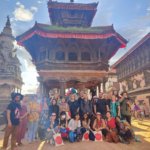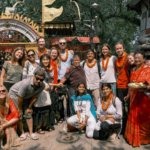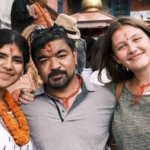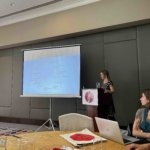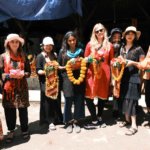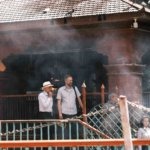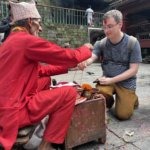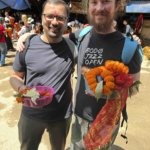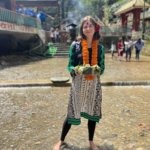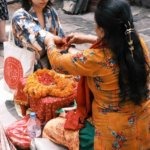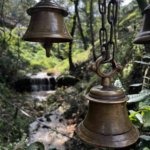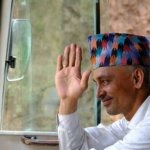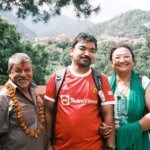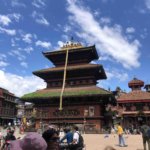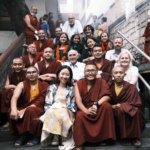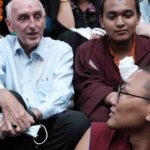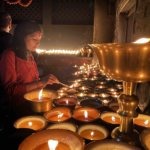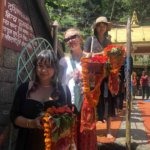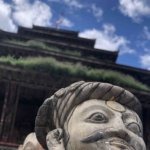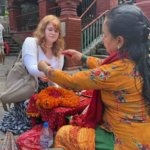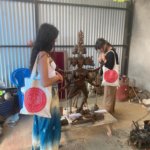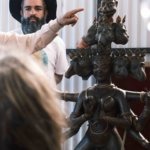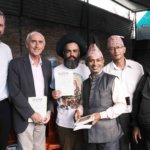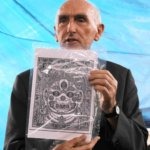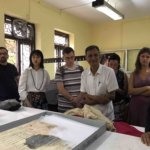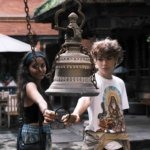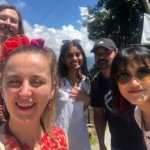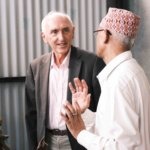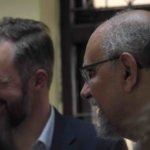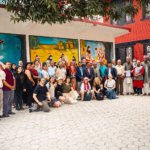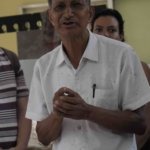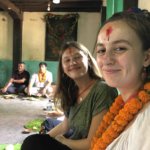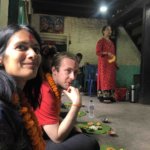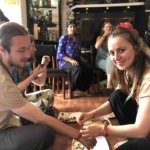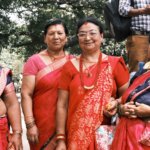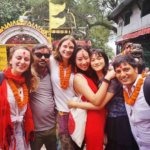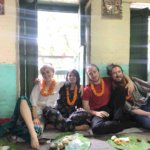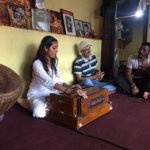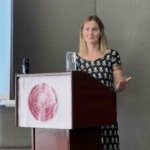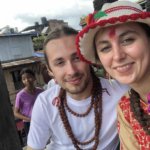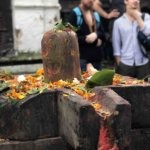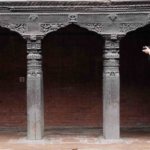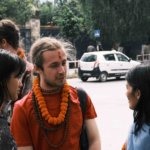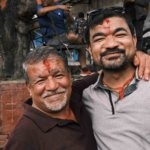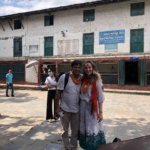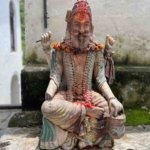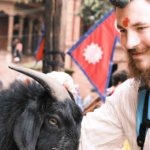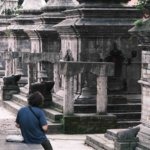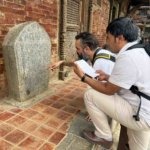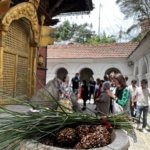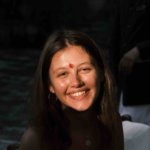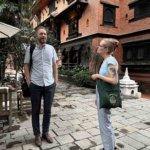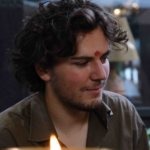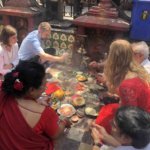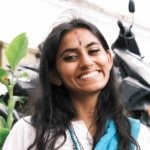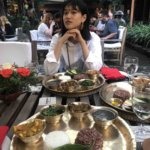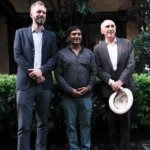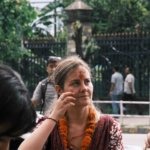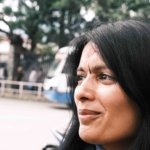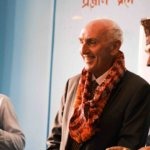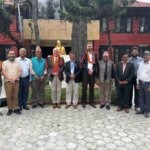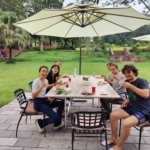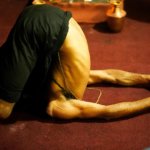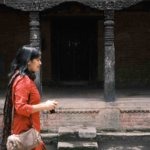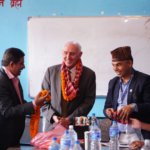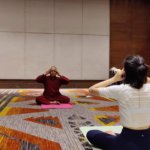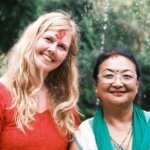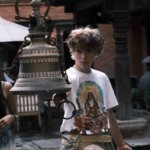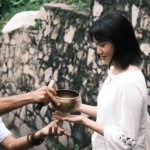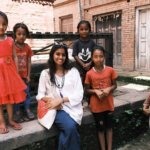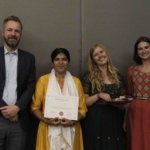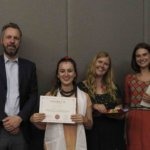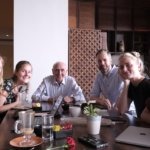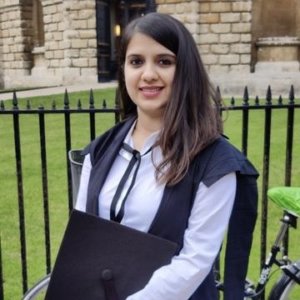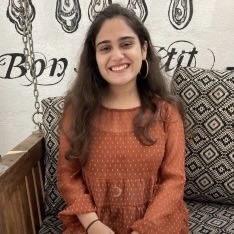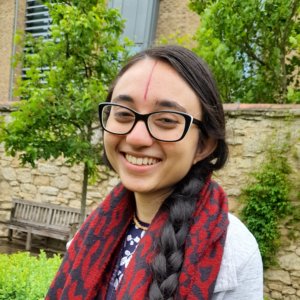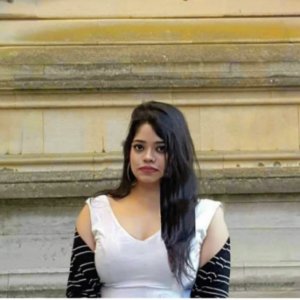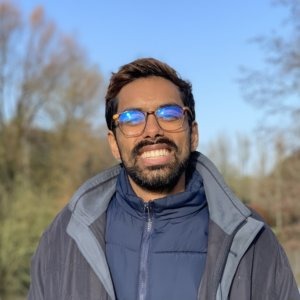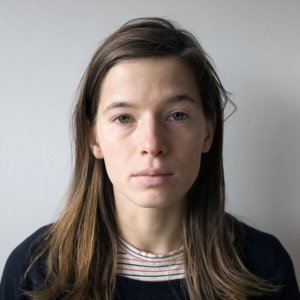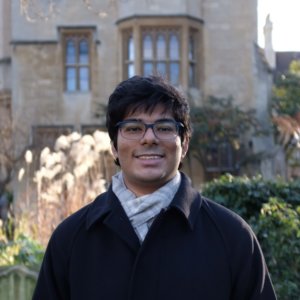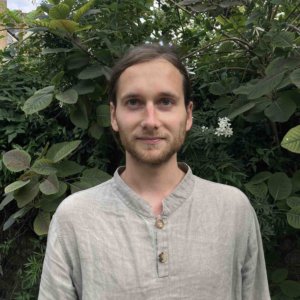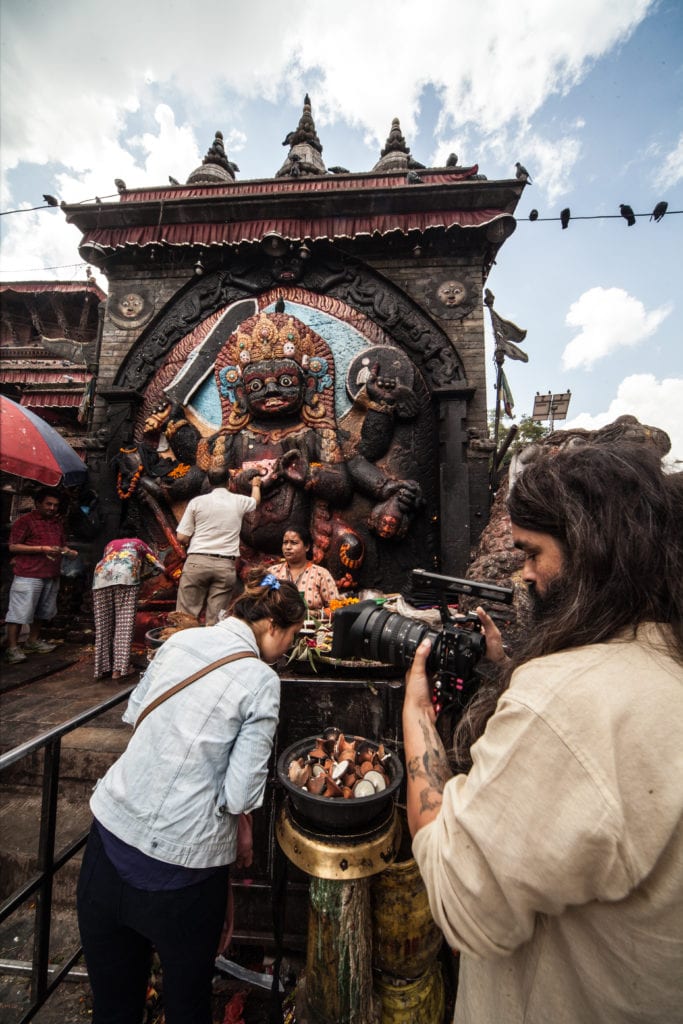Lecture List
Hilary Term 2023
Sunday 15th January – Saturday 11th March
Hinduism 2: Modern Hinduism
Week 1-8, Friday 4.00-5.00
Faculty of Theology & Religion
Dr Rembert Lutjeharms
This paper traces the development of Hinduism from the medieval period through to modernity. The course will examine Hindu scholasticism, devotional and tantric traditions, and modern Hindu thought. The lectures will explore themes of liberation, the soul and the divine, Tantra and meditation, devotional literature and the formation of modern Hindu identity.
Sanskrit and Pali Prelims 2
Week 1-8, Wednesday 4.30-6.00, Friday 10.30-12.00
OCHS Library
Dr Bjarne Wernicke-Olesen
The course provides an introduction to Sanskrit for the preliminary paper of the Theology and Religion Faculty in Elementary Sanskrit. Students of Pali will join the Sanskrit course in Michaelmas Term and for the first four weeks of Hilary Term. From week 5 of Hilary Term, Sanskrit and Pali will be taught as two separate courses, i.e., Sanskrit Prelims and Pali for Sanskritists.
Sanskrit Prelims: A range of relevant Hindu and Buddhist texts will be chosen for translation and philological comment in the Sanskrit course. The class is designed to introduce students of Theology and Religion to the essentials of Sanskrit grammar, syntax, and vocabulary and its importance for the exegesis of Sanskrit texts. Students will learn to appreciate the interpretative nature of translation as a central discipline for the study of religions. By the end of the course students will have gained a basic competency in translating classical Sanskrit and reading relevant passages from texts such as the Chāndogya Upaniṣad, the Bhagavadgītā, the Haṭhayogapradīpikā and the Buddhist Heart Sūtra. The course book will be Walter Maurer’s The Sanskrit Language. Sanskrit Prelims continues throughout Michaelmas and Hilary Terms and for the first four weeks of Trinity.
Pali prelims (Pali for sanskritists)
Week 5-8, Tuesday 4.00-5.30, Thursday 4.00-5.30
OCHS Library
Dr Bjarne Wernicke-Olesen
Pali students will attend the same ‘Sanskrit and Pali’ classes as Sanskrit students in Michaelmas Term and weeks 1-4 of Hilary Term. From week 5 of Hilary Term, Pali and Sanskrit students will study in separate classes.
The Pali course is designed to provide an easy philological introduction to Pali Buddhist texts via Sanskrit and introduce students of Theology and Religion to the essentials of Pali grammar, syntax, and vocabulary. A range of relevant Pali Buddhist texts will be chosen for translation and philological comment. We will read classical Theravāda Buddhist discourses from the Pāli Canon such as the Fire Sermon (Ādittapariyāya-sutta) and Dependent Origination (Paṭiccasamuppāda) as well as passages from the Dhammapada and the Jātaka tales. Students will learn to appreciate the interpretative nature of translation as a central discipline for the study of religions. The course book will be Dines Andersen, A Pāli Reader and Pali Glossary, 2 vols. (1901) supplemented by Rune E. A. Johansson, Pali Buddhist Texts: An Introductory Reader and Grammar (1981).
Readings in Phenomenology
Weeks 1-8, Monday 12.00-1.00
OCHS Library
Professor Gavin Flood
Phenomenology is one of the most important developments in philosophy in the twentieth century, and it has also had a deep impact on other theoretical fields more widely conceived. This term we will read essays from Martin Heidegger, Holzwege (Off the Beaten Track), in particular ‘The Origin of the Work of Art.’ We’ve read Being and Time and then Basic Problems, this takes us into the later work of the philosopher.
Lectures of the J.P. And Beena Khaitan Visiting Fellow
9 Rooms: Philip Rawson and the exhibiting of tantra
Week 5, Thursday 16th February, 2.00-3.00
OCHS Library
Professor Chris Dorsett
Both my lectures are about a leading British authority on Indian art, Philip Rawson (1924-1995). The title of my first lecture refers to the nine enclosed spaces in which the celebrated Tantra exhibition he curated in 1971 was laid out at London’s Hayward Gallery. The arrangement confounded an important modernist conviction that any exhibit worth seeing required a clinically minimal mode of display. The Hayward was a minimal ‘white cube’ but, paradoxically, Rawson gathered hundreds of historical Indian items within confined coloured rooms, and heightened the viewer’s sensory engagement with ambient sound and slide projections. The results were widely held to have had greater contemporary resonance than the concurrent exhibition of new Californian art on the Hayward’s upper floor.
The contradiction was not lost on me. As a postgraduate student at the Royal College of Art I had gone to see what artists on the west coast of America were doing, but discovered instead, much closer to home, experimental forms of art practice being spectacularly put to work in the service of cultural material usually found in museums. Frustratingly, the Arts Council of Great Britain archive, which holds documents on the commissioning and popular reception of this exhibition, contains no installation photographs; so there is no record of what Tantra actually looked like. As a result, I will set out how the research I am undertaking at the Oxford Centre for Hindu Studies re-engages with the sensorily-charged enclosures that Rawson derived from the nine emotional states (rasas) described by the tantric sage Abhinavagupta. The impact of Rawson’s tantrism on the London art scene of the early 1970s will be re-appraised, but my real goal is the creation of new practice-based contexts for researching his pioneering exhibition-making. Just over 50 years after Tantra closed I would like to see the show’s curator receive more attention.
9 Bookmarks: Rawson's writing and the influence of Abhinavagupta
Week 7, Thursday 2nd March, 2.00-3.00
OCHS Library
Professor Chris Dorsett
Lecture two is an analysis of Philip Rawson’s textual references to the aesthetic speculations of Abhinavagupta, which not only influenced the layout of the Tantra exhibition, but also provided a theoretical underpinning for the many art books Rawson wrote throughout his career. He was a very creative museum professional who also thought of himself as an art educator and, from this perspective, he saw art schools as laboratories for the advancement of sensory experience and the amplification of what we now call ‘affect’.
In the Tantra exhibition he had (purposely, I think) addressed the experimental aspirations of Western art students, and those of us who thronged the Hayward Gallery were busy reading his latest publications. In particular, Drawing (1969) and Ceramics (1971) were landmarks in their field, and Indian aesthetics are perceptively at work in both books – both entwine passionate explorations of the ‘language’ of these art forms with the sensible, embodied, and numinous values we associate with Abhinavagupta’s philosophical reflections. Consequently, in this second lecture I discuss some of the most theoretical passages in Rawson’s writing at the time he was curating the Hayward show.
Over the years, my own copies of Drawing and Ceramics have accumulated impromptu bookmarks made from offcuts of my drawings, and these must figure in the discussion because they are a by-product of my long rumination on Rawson’s educational thinking. A year after the Tantra exhibition closed he joined the staff at the Royal College of Art and became my teacher and mentor. Thus, my account is built upon a great deal of direct knowledge which is, on the one hand, sensitive to the educative significance Rawson attributed to aesthetic encounters, but on the other hand, inflected by an acknowledgement that his books are now placed at some distance from a world that is post-structuralist, postmodern, and postcolonial.
Professor Chris Dorsett is an artist and academic whose career has been built on curatorial partnerships with collection-holding institutions. In the UK he is best known for his pioneering exhibitions at the Pitt Rivers Museum where, having stepped back from his art school commitments in 2018, he is now an Associate Researcher. Dorsett’s many overseas projects include museum ‘interventions’ across the Nordic region and fieldwork residencies in the Amazon and at the walled village of Kat Hing Wai in the New Territories of Hong Kong. These projects were developed during university appointments at the Ruskin School of Art, Oxford; Central St. Martin’s School of Art, London; Royal University Institute of Fine Art, Stockholm; Northumbria University, Newcastle Upon Tyne; and Edinburgh School of Art. He is on the editorial board of Museum Worlds and has written extensively on the interface between experimental art practices and the museum/heritage sector for publishers such as Routledge and Intellect Books. Most recently, in conjunction with the Oxford Centre for Hindu Studies, he has been researching the museological legacy of the historian of Indian Art, Philip Rawson.
Other Lectures
Metaphysical Thinking in India
Weeks 2, 4, 6, 8, Thursdays, 2.00-3.00
OCHS Library
Professor Gavin Flood
These lectures will reflect on metaphysical speculation in the history of Indian religions paying particular attention to the ways in which doing, or practice, connects with thinking, or philosophy, and how metaphysical concerns address problems of the relation of self to world, the nature and meaning of sacrifice, the category of the self in relation to person and transcendence, and the nature of language. Although the chronological span of these lectures will be wide, we will nevertheless focus on the early medieval (i.e., the post-Gupta) period for by this time the different schools were established and there is a history of discourse that we can examine. The implicit thesis of the lectures is that action, and in particular ritual action, is the backbone of tradition and that philosophical reflection emerges from the nature of humans as creatures who act. We will not simply present and assess arguments, but rather try to open out or enter into the world in which metaphysical thinking occurs through examining ritual and meditative literature as well as philosophical commentaries and independent works. Examples chosen will mostly be from the religions of Śiva and the Goddess but not exclusively so.
Lecture 1: The Metaphysics of the Act
Week 2, 26th January, 2.00-3.00
Sacrifice is at the foundation of the history of Indian thinking about the nature of the world, God, and human beings. There is a large literature that focusses on ritual action from early Vedic texts to ritual manuals (paddhatis) in the medieval period. This emphasis on action in the Brahmanical imagination led to the development of the school of Vedic exegesis, the Mīmāṃsā, which presents a philosophy of action that the lecture will explore. For the Mīmāṃsā, the most significant feature of human reality is that we act: action is the most distinctive human feature, more important than cognition, because action has consequences in the world. Above all, as human beings we need to be concerned with action as enjoined by scriptural revelation, thus ritual action. The ritual act for the Mīmāṃsā, namely the sacrifice, is performed not to achieve a specific purpose, such as going to heaven at death, but because it is enjoined by scripture. The Mīmāṃsā is thus reflection not so much on ritual per se but on the nature of Vedic anguagee. We should act in conformity to dharma, truth or duty, and the founding text of the philosophical school, Jaimini’s Mīmāṃsā Sūtra, opens with the statement: ‘Now the inquiry into Dharma’.
Lecture 2: The Existence of God
Week 4, 9th February, 2.00-3.00
Although the Mīmāṃsā reflected on action and language as the essential components of any account of what it is to be human, there were also systems that presented more abstract arguments for the existence of a putative theistic reality, particularly the Nyāya or Logical School and the Śaiva schools. We will describe these arguments and place them in relation to wider cultural concerns about the act and raise the question as to what these arguments sought to achieve and for whom they were written.
Lecture 3: Implicit metaphysics in the Netra-tantra
Week 6, 23rd February, 2.00-3.00
A focus on action and drawing from it a metaphysics or proto-philosophy, is found in the Netra-tantra, originally composed in the seventh or eighth centuries. This text is replete with suggestions for performance in different deity systems, yet retains a conceptual and textual coherence. We will examine the idea of a trans-cosmic reality in the text, how this manifests in and as world, and how different systems of action (ritual and meditation) lead to that reality.
Lecture 4: Explicit metaphysics of Non-Dual Śaivism
Week 8, 9th March, 2.00-3.00
The dualist school of the religion Śiva, the Śaiva Siddhānta, is rooted in ritual action which it regards as salvific. Through certain acts following initiation by the master who embodies Śiva for the duration of the rite, the practitioner can be saved from suffering in the cycle of action. Metaphysics here is on the leash of the ritual act. By contrast the non-dual Śaivas regarded the distinctions of human reality to be based on a misguided cognition that needs to be replaced by the recognition (prayabhijñā) that cognition or gnosis (jñāna) not action, is salvific. This philosophy is supported by the appropriation of the philosophy of language. We will present a description of this system and raise questions about coherence and meaning.
Senior Seminar in Indian Religions
This series of regular seminars brings together scholars and students working on Indic philosophies and religions. It focuses on topics of current research: in each session, two people will present a context they are investigating for 20min, and then open it for discussion on key questions. All researchers, graduates and finalists in all areas are welcome to join.
Solving Metaphysical Mysteries: The archaeology of arguments in Vedantic texts
Week 3, Wednesday 1st February, 3.00-4.00
OCHS Library
Lead by Dr Jessica Frazier
The intellectual history of Indian philosophical schools presents fascinating puzzles of periodisation and mutual influence. But relatively little has been done to excavate the philosophical arguments in Vedantic texts and examine them on their own philosophical merits. In this short seminar discussion, we will dig out arguments for Brahman in a Vedantic text, and untangle their implications
Tantric Meditation and Phenomenology
Week 7, Wednesday 1st March, 3.00-4.00
OCHS Library
Lead by Professor Gavin Flood
This seminar will discuss meditation on ‘the sky of consciousness’ (cidgagana) in Krama texts, identified with the Goddess, and will consider Phenomenology as an approach to understanding this material. If there needs to be an adequation between approach or method and intellectual object, what are the advantages and/or disadvantages of Phenomenology?
Netra Tantra seminar
Week 7, Tuesday 28th February, 10.00-15.30
Venue: Campion Hall (10.00-12.45) and Oxford Centre for Hindu Studies (14.00-15.30)
Convenor: Dr Bjarne Wernicke-Olesen
Timetable and Abstracts
10.00-10.15 Welcome
Professor Gavin Flood, FBA
Campion Hall
10.15-11.00 The Netratantra: Its Vision and Themes
Professor Gavin Flood, FBA
Campion Hall
The Netratantra, the ‘Tantra of the Eye’, is an important tantric text in Kashmir and Nepal, dating from around the early ninth century, and widely disseminated during the eleventh and probably tenth centuries. The text takes its name from Śiva as Netranātha or ‘Lord of the Eye’. However, the text is a ‘universal’ (sarvasāmānya-) tantra, which overrides the distinctions between various tantric traditions. The central deity of the Netratantra is Amṛteśvara, whose consort is Lakṣmī/Śrī called Amṛtalakṣmī in ritual manuals based on the text. After an initial chapter in which Amṛteśvara, referred to as Bhairava, responds to the questions of the Goddess by extolling the virtues and powers of Śiva’s eye, the text presents a number of visualisations of a number of deities, catholic in its range, not only from the systems of the Mantramārga but from Vaiṣṇava traditions as well. Furthermore, a strong Śākta influence is evident in the text with its many references to female deities and practices characteristic of the Kulamārga, e.g. chapter 7 on the subtle visualising meditation and chapter 20 on yoginīs.
Professor Gavin Flood FBA (Oxford), Dr Bjarne Wernicke-Olesen (Oxford) and Dr Rajan Khatiwoda (Heidelberg) are currently working on a fully annotated translation of the Netratantra with an introduction in two volumes in the Routledge Studies in Tantric Traditions series. The project to study the text will especially focus on the theme of models of the person or self that the text entails. Based on close philological reading, we hope to account for different understandings of the person implicit in the text.
Gavin Flood is a Professor of Hindu Studies and Comparative Religion in the Theology and Religion Faculty and academic director of the Oxford Centre for Hindu Studies. Gavin read Religious Studies and Social Anthropology at Lancaster University and taught at the universities of Wales (Lampeter) and Stirling before coming to Oxford. He was elected to membership of the British Academy in 2014. His research interests are in medieval Hindu texts (especially from the traditions of Śiva), comparative religion, and phenomenology. He is general series editor of the Oxford History of Hinduism and currently developing closer textual work on the Netratantra.
11.00-11.15 Tea and Coffee
11.15-12.00 Digital Humanities and Hindu Studies: Building a Śākta Manuscript Database
Dr Ulrik Lyngs, Michael Elison
Campion Hall
New tools from the digital humanities hold considerable promise to augment traditional scholarly analysis in Hindu Studies. Compared to traditional workflows in which scholars manually collate, compare and critically edit manuscripts into edited volumes, computational methods allow many time-consuming tasks to be automated, and new understandings and insights based on the analysis of large volumes of text can be obtained that would previously have been impossible.
In this talk, I present our work-in-progress on an OCHS Manuscript Database using the Netra Tantra as an example. This database will make thousands of manuscripts available, drawn from the OCHS Kathmandu digitisation project, the National Archives of Nepal, the ASA archives, and more. Compared to existing major manuscript databases such as the Cambridge Digital Library, our database will offer a more advanced interface which, for example, allow users to see transliterated and translated texts side-by-side with images of the original manuscripts. Over time, the database will include computational tools that allow easy textual analysis and concordance, and automatic generating of formatted PDFs or Word files with customised content of specific manuscripts.
Ulrik Lyngs is a Carlsberg Foundation Oxford Visiting at the University of Oxford’s Human Centred Computing group, and a Junior Research Fellow of Linacre College. He has a highly interdisciplinary background, with a PhD in Computer Science (University of Oxford), an MA in the study of religion and cognitive psychology (Aarhus University), and an MSc in evolutionary anthropology (University of Oxford). His PhD research on attention and self-regulation in human-computer interactions received the Doctoral Prize from the Engineering and Physical Sciences Research Council. He has previously been a producer at HowTheLightGetsIn, the world’s largest philosophy and music festival.
12.00-12.30 Readings in the Netratantra: Chapter 7 on Subtle Visualising Meditation (sūkṣmadhyāna)
Dr Bjarne Wernicke-Olesen
Campion Hall
The lecture will present a reading and discussion of significant passages from the Netratantra’s chapter 7 on subtle visualising meditation. The chapter is significant in that it presents two different anthropologies and systems of visualization, which the Trika commentator Kṣemarāja refers to as the tantric system (tantraprakriyā) and the Kula system (kulaprakriyā). As opposed to the more body-rejecting practices of classical yoga, the Kula system or what may be termed a ‘Śākta anthropology’ of tantric yoga aims at the affirmation and divinization of the body. This Śākta model of the human is first mentioned in the Netratantra’s chapter 7 on subtle visualising meditation (sūkṣmadhyāna). The Netratantra is also the first to mention the Kulamārga and to teach a system of six bodily centers called cakras, which the meditating yogi is supposed to pierce with his inherent power or śakti. This Śākta anthropology is introduced in the first few verses of chapter seven and then elaborated. The text presents an early Śākta appropriation of older yogic models of ‘knots’ (granthis), ‘supports’ (ādhāras) etc. foregrounding the central channel (suṣumnā) and the notion of how the yogi causes the ascent of his inner power as an early form of kuṇḍalinīyoga. Furthermore, the yogi’s inner power (śakti) was also conceived of in terms of sound or inner vibration (nādasūcī, ‘the needle of sound’).
Bjarne Wernicke-Olesen is Research Lecturer at the Oxford Centre for Hindu Studies and a member of the Theology and Religion Faculty where he teaches Sanskrit, Pali and Indian religions. He is the research director and manager for the Śākta Traditions research programme. His book publications include an introduction to Hinduism (2015), translations of the Bhagavadgītā (2009) and the Haṭhapradīpikā (2022) as well as a Danish Sanskrit Grammar and Reader in two volumes (2014). He is the editor of Goddess Traditions in Tantric Hinduism (2016) and has written a number of articles on Śāktism, yoga and meditation in Danish, German and English. He is currently working on several book projects, including an English translation and annotated edition of the Netratantra (based on the oldest available Nepalese manuscript, NAK MS 1-285, NGMPP Reel No. B 25/5 from 1200 CE) in two volumes for the Routledge Tantric Studies series together with Dr Rajan Khatiwoda and Professor Gavin Flood.
12.30-13.00 Tradition of Manuscript Production: Nepalese Recension of the Netratantra in the National Archives of Nepal
Dr Rajan Khatiwoda
Campion Hall
Not only has the Kathmandu Valley preserved an ancient compendium of Suśruta (Suśrutasaṃhitā) copied in 878 CE, but also the earliest surviving Śaiva text, Niśvāsatattvasaṃhitā copied sometime in the 9th century. Similarly, the National Archives of Nepal houses a well-preserved recension of the Netratantra ‘Tantra of the Eye’, an important text in Kashmir dating from around the early ninth century. Of the four Nepalese Netra-manuscripts, the oldest ‘Mṛtyujidamṛtīśavidhāna’ was copied in 1200 CE. The second oldest ‘Amṛteśvarapūjana’ was commissioned by Abhaya Malla in 1216 CE, most likely to protect his father, King Ari Malla, who was said to be dying. The lecture will attempt to shed light on the manuscript sources (as well as their scribal and palaeographical features) for the study of the Netatrantra.
Rajan Khatiwoda currently holds the position of Chief Scientific Documentation Coordinator in the Nepal Heritage Documentation Project (NHDP) at the Heidelberg Academy of Sciences and Humanities (HAdW). He is also the Honorary Leader of the Kathmandu Office of the Śākta Traditions Project run under the Oxford Centre for Hindu Studies (OCHS) and a Research Fellow at OCHS affiliated with the Śākta Traditions research programme. Khatiwoda studied Classical Indology at Heidelberg University, from where he received his PhD in 2017. His dissertation deals with the formation and enforcement of the Mulukī Ain, Nepal’s first legal code promulgated in 1854. From 2013 to 2016, he was part of the Cluster´s Project A14 “Transcultural Legal Flows in 18th- and 19th-Century South Asia.” Since 2014, Khatiwoda is research associate at the South Asian Institute, Heidelberg University, and the Research Unit “Documents on the History of Religion and Law of Pre-modern Nepal,” Heidelberg Academy of Sciences and Humanities. Previously, he worked as a research assistant and cataloguer for the Nepalese-German Manuscript Cataloguing Project (NGMCP) and the Nepal Research Centre (NRC) in Kathmandu for nine years (2004–2013).
13.00-14.30 Lunch (on your own)
14.30-15.00 Book presentation and reception:
Goddess Traditions in India: Theological Poems and Philosophical Tales in the Tripurārahasya (Routledge Hindu Studies Series)
Dr Silvia Schwarz Linder
OCHS Library
This new book on the Tripurārahasya, a South Indian Sanskrit work which occupies a unique place in the Śākta literature, is a study of the Śrīvidyā and Śākta traditions in the context of South Indian intellectual history in the late middle ages. Associated with the religious tradition known as Śrīvidyā and devoted to the cult of the Goddess Tripurā, the text was probably composed between the 13th and the 16th century CE. The analysis of its narrative parts addresses questions about the relationships between Tantric and Purāṇic goddesses. The discussion of its philosophical and theological teachings tackles problems related to the relationships between Sākta and Śaiva traditions. The stylistic devices adopted by the author(s) of the work deal uniquely with doctrinal and ritual elements of the Śrīvidyā through the medium of a literary and poetic language. This stylistic peculiarity distinguishes the Tripurārahasya from many other Tantric texts, characterized by a more technical language.
Silvia Schwarz Linder has a PhD in South Asian Studies (University of Vienna). She has lectured in the past at the Leopold-Franzens-Universität in Innsbruck and at the University Ca’ Foscari in Venice. She was Research Associate at the Institut für Indologie und Zentralasienwissenschaften of the University of Leipzig, and is currently Research Fellow at the OCHS. Her interests focus on the Tantric religious traditions of the Śrīvidyā and of the Pāñcarātra, specifically on the philosophical and theological doctrines expressed in the relevant South Indian Sanskrit textual traditions. She has also translated into Italian texts from the Sanskrit narrative and devotional literature, for editions aimed at a general readership.
15.00 Reception


